Financial Management Report: Agency Theory, Policies, and Management
VerifiedAdded on 2020/06/06
|6
|1273
|90
Report
AI Summary
This report delves into the realm of financial management, exploring the critical role of management and the application of agency theory. It begins by defining financial management and its objectives, including wealth and profit maximization, and the sustainability of the business. The report then evaluates the management's role in achieving these objectives, highlighting the importance of dividend policies, investment decisions, and the maintenance of working capital. Agency theory is introduced as a framework for understanding the relationships between stakeholders and ensuring that agents act in the best interests of the business. The report further examines macroeconomic policies, specifically fiscal, monetary, and exchange rate policies, and their impact on economic stability, capital formation, and investment. It explains the roles of these policies in controlling inflation, managing employment levels, and mobilizing savings. The report concludes by emphasizing the significance of financial management as a key tool for effective business operations.
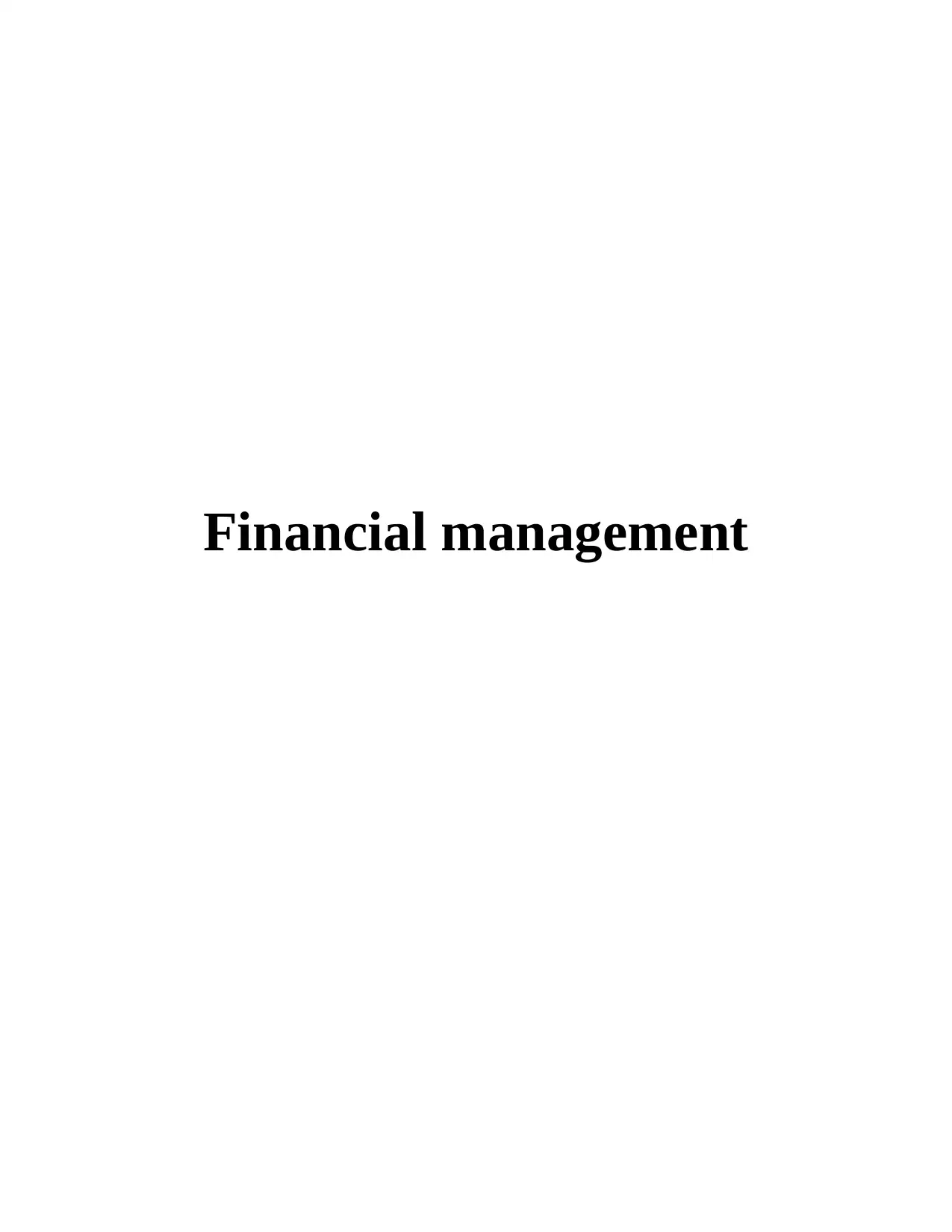
Financial management
Paraphrase This Document
Need a fresh take? Get an instant paraphrase of this document with our AI Paraphraser
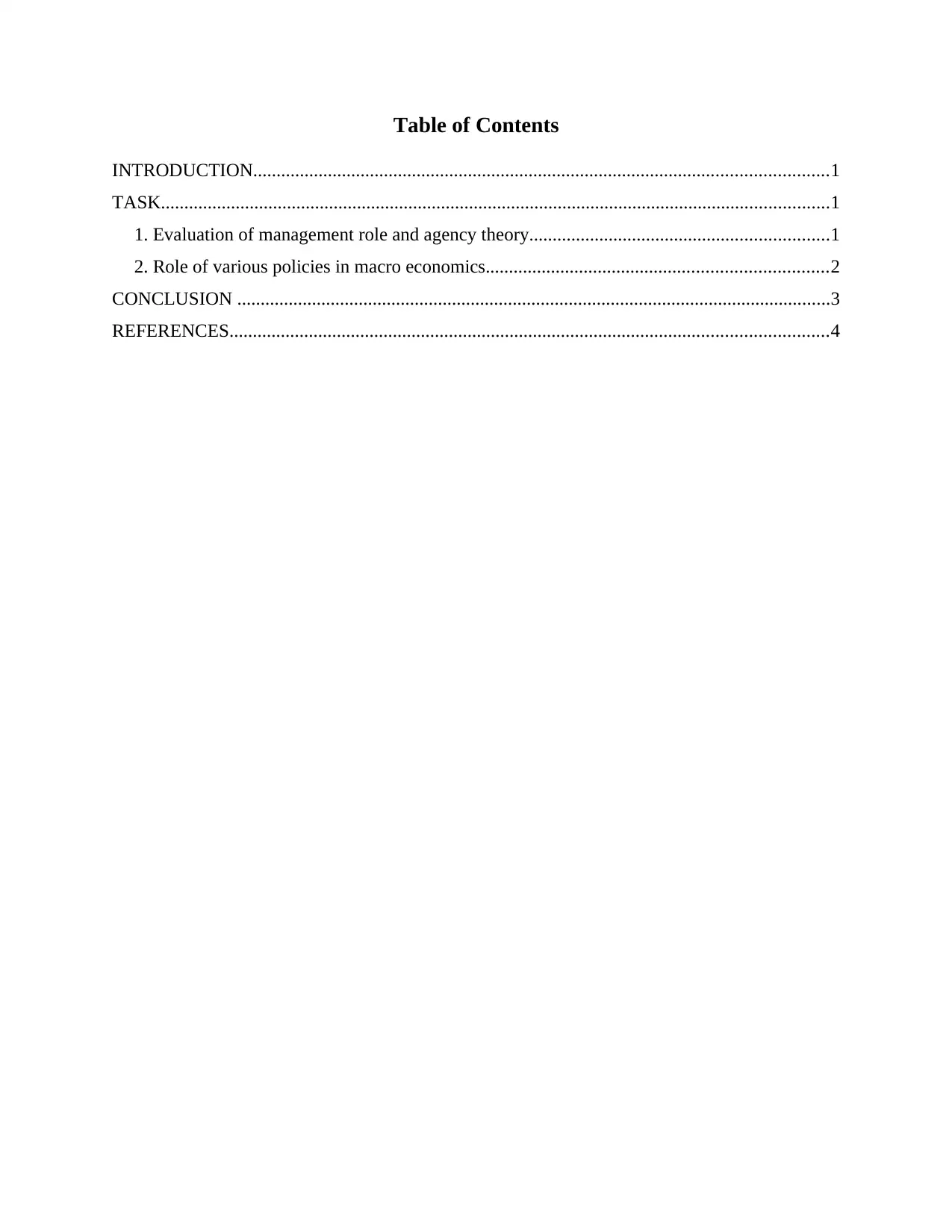
Table of Contents
INTRODUCTION...........................................................................................................................1
TASK...............................................................................................................................................1
1. Evaluation of management role and agency theory................................................................1
2. Role of various policies in macro economics.........................................................................2
CONCLUSION ...............................................................................................................................3
REFERENCES................................................................................................................................4
INTRODUCTION...........................................................................................................................1
TASK...............................................................................................................................................1
1. Evaluation of management role and agency theory................................................................1
2. Role of various policies in macro economics.........................................................................2
CONCLUSION ...............................................................................................................................3
REFERENCES................................................................................................................................4
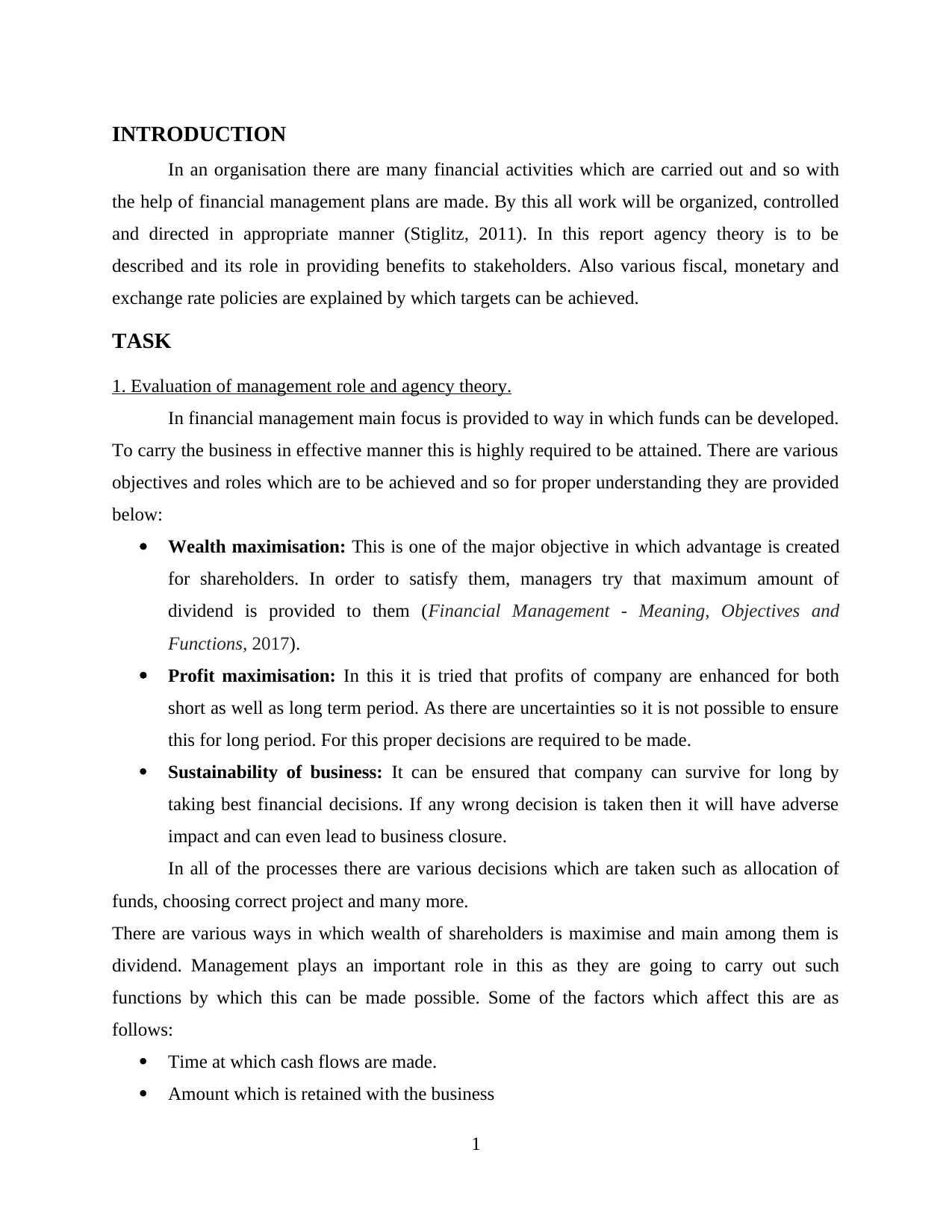
INTRODUCTION
In an organisation there are many financial activities which are carried out and so with
the help of financial management plans are made. By this all work will be organized, controlled
and directed in appropriate manner (Stiglitz, 2011). In this report agency theory is to be
described and its role in providing benefits to stakeholders. Also various fiscal, monetary and
exchange rate policies are explained by which targets can be achieved.
TASK
1. Evaluation of management role and agency theory.
In financial management main focus is provided to way in which funds can be developed.
To carry the business in effective manner this is highly required to be attained. There are various
objectives and roles which are to be achieved and so for proper understanding they are provided
below:
Wealth maximisation: This is one of the major objective in which advantage is created
for shareholders. In order to satisfy them, managers try that maximum amount of
dividend is provided to them (Financial Management - Meaning, Objectives and
Functions, 2017).
Profit maximisation: In this it is tried that profits of company are enhanced for both
short as well as long term period. As there are uncertainties so it is not possible to ensure
this for long period. For this proper decisions are required to be made.
Sustainability of business: It can be ensured that company can survive for long by
taking best financial decisions. If any wrong decision is taken then it will have adverse
impact and can even lead to business closure.
In all of the processes there are various decisions which are taken such as allocation of
funds, choosing correct project and many more.
There are various ways in which wealth of shareholders is maximise and main among them is
dividend. Management plays an important role in this as they are going to carry out such
functions by which this can be made possible. Some of the factors which affect this are as
follows:
Time at which cash flows are made.
Amount which is retained with the business
1
In an organisation there are many financial activities which are carried out and so with
the help of financial management plans are made. By this all work will be organized, controlled
and directed in appropriate manner (Stiglitz, 2011). In this report agency theory is to be
described and its role in providing benefits to stakeholders. Also various fiscal, monetary and
exchange rate policies are explained by which targets can be achieved.
TASK
1. Evaluation of management role and agency theory.
In financial management main focus is provided to way in which funds can be developed.
To carry the business in effective manner this is highly required to be attained. There are various
objectives and roles which are to be achieved and so for proper understanding they are provided
below:
Wealth maximisation: This is one of the major objective in which advantage is created
for shareholders. In order to satisfy them, managers try that maximum amount of
dividend is provided to them (Financial Management - Meaning, Objectives and
Functions, 2017).
Profit maximisation: In this it is tried that profits of company are enhanced for both
short as well as long term period. As there are uncertainties so it is not possible to ensure
this for long period. For this proper decisions are required to be made.
Sustainability of business: It can be ensured that company can survive for long by
taking best financial decisions. If any wrong decision is taken then it will have adverse
impact and can even lead to business closure.
In all of the processes there are various decisions which are taken such as allocation of
funds, choosing correct project and many more.
There are various ways in which wealth of shareholders is maximise and main among them is
dividend. Management plays an important role in this as they are going to carry out such
functions by which this can be made possible. Some of the factors which affect this are as
follows:
Time at which cash flows are made.
Amount which is retained with the business
1
⊘ This is a preview!⊘
Do you want full access?
Subscribe today to unlock all pages.

Trusted by 1+ million students worldwide
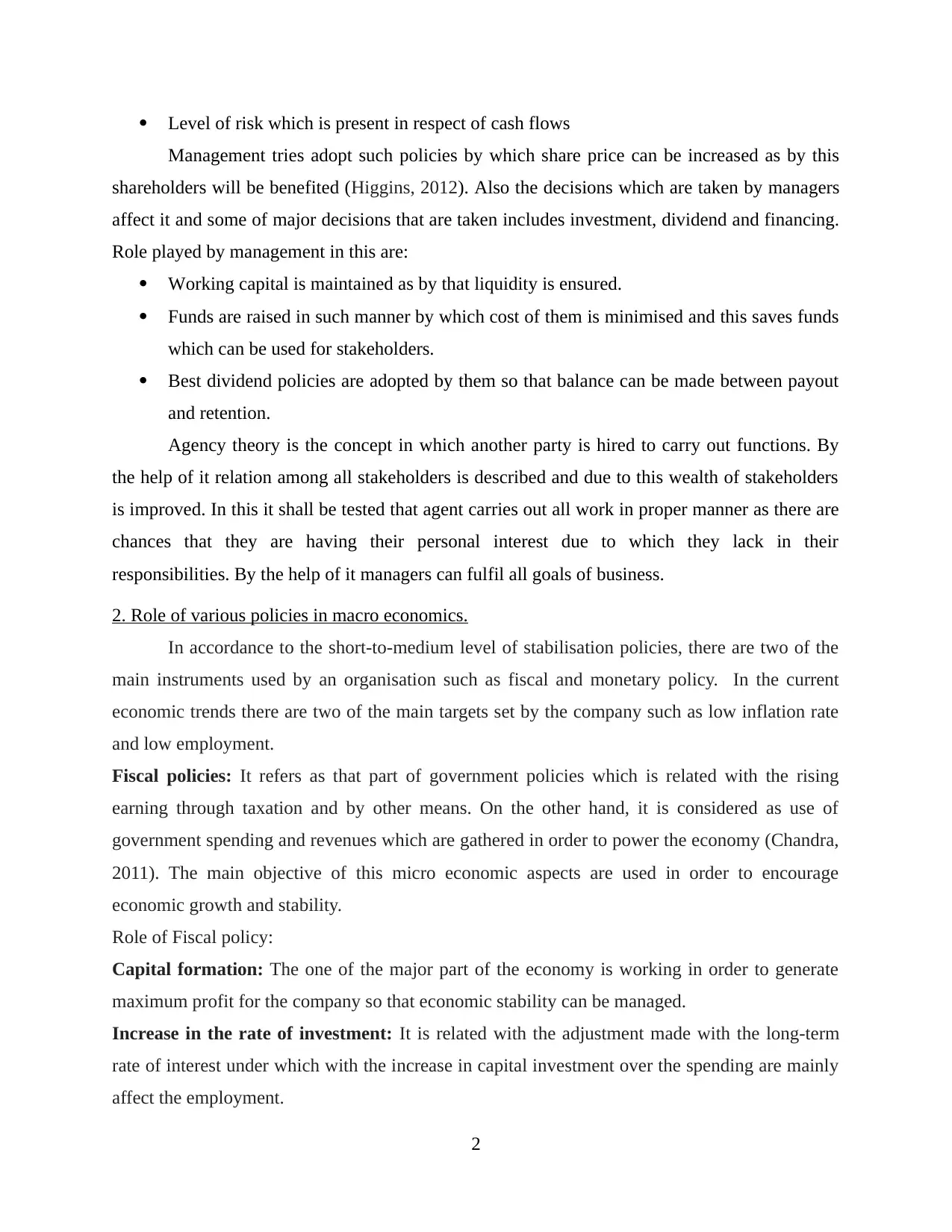
Level of risk which is present in respect of cash flows
Management tries adopt such policies by which share price can be increased as by this
shareholders will be benefited (Higgins, 2012). Also the decisions which are taken by managers
affect it and some of major decisions that are taken includes investment, dividend and financing.
Role played by management in this are:
Working capital is maintained as by that liquidity is ensured.
Funds are raised in such manner by which cost of them is minimised and this saves funds
which can be used for stakeholders.
Best dividend policies are adopted by them so that balance can be made between payout
and retention.
Agency theory is the concept in which another party is hired to carry out functions. By
the help of it relation among all stakeholders is described and due to this wealth of stakeholders
is improved. In this it shall be tested that agent carries out all work in proper manner as there are
chances that they are having their personal interest due to which they lack in their
responsibilities. By the help of it managers can fulfil all goals of business.
2. Role of various policies in macro economics.
In accordance to the short-to-medium level of stabilisation policies, there are two of the
main instruments used by an organisation such as fiscal and monetary policy. In the current
economic trends there are two of the main targets set by the company such as low inflation rate
and low employment.
Fiscal policies: It refers as that part of government policies which is related with the rising
earning through taxation and by other means. On the other hand, it is considered as use of
government spending and revenues which are gathered in order to power the economy (Chandra,
2011). The main objective of this micro economic aspects are used in order to encourage
economic growth and stability.
Role of Fiscal policy:
Capital formation: The one of the major part of the economy is working in order to generate
maximum profit for the company so that economic stability can be managed.
Increase in the rate of investment: It is related with the adjustment made with the long-term
rate of interest under which with the increase in capital investment over the spending are mainly
affect the employment.
2
Management tries adopt such policies by which share price can be increased as by this
shareholders will be benefited (Higgins, 2012). Also the decisions which are taken by managers
affect it and some of major decisions that are taken includes investment, dividend and financing.
Role played by management in this are:
Working capital is maintained as by that liquidity is ensured.
Funds are raised in such manner by which cost of them is minimised and this saves funds
which can be used for stakeholders.
Best dividend policies are adopted by them so that balance can be made between payout
and retention.
Agency theory is the concept in which another party is hired to carry out functions. By
the help of it relation among all stakeholders is described and due to this wealth of stakeholders
is improved. In this it shall be tested that agent carries out all work in proper manner as there are
chances that they are having their personal interest due to which they lack in their
responsibilities. By the help of it managers can fulfil all goals of business.
2. Role of various policies in macro economics.
In accordance to the short-to-medium level of stabilisation policies, there are two of the
main instruments used by an organisation such as fiscal and monetary policy. In the current
economic trends there are two of the main targets set by the company such as low inflation rate
and low employment.
Fiscal policies: It refers as that part of government policies which is related with the rising
earning through taxation and by other means. On the other hand, it is considered as use of
government spending and revenues which are gathered in order to power the economy (Chandra,
2011). The main objective of this micro economic aspects are used in order to encourage
economic growth and stability.
Role of Fiscal policy:
Capital formation: The one of the major part of the economy is working in order to generate
maximum profit for the company so that economic stability can be managed.
Increase in the rate of investment: It is related with the adjustment made with the long-term
rate of interest under which with the increase in capital investment over the spending are mainly
affect the employment.
2
Paraphrase This Document
Need a fresh take? Get an instant paraphrase of this document with our AI Paraphraser
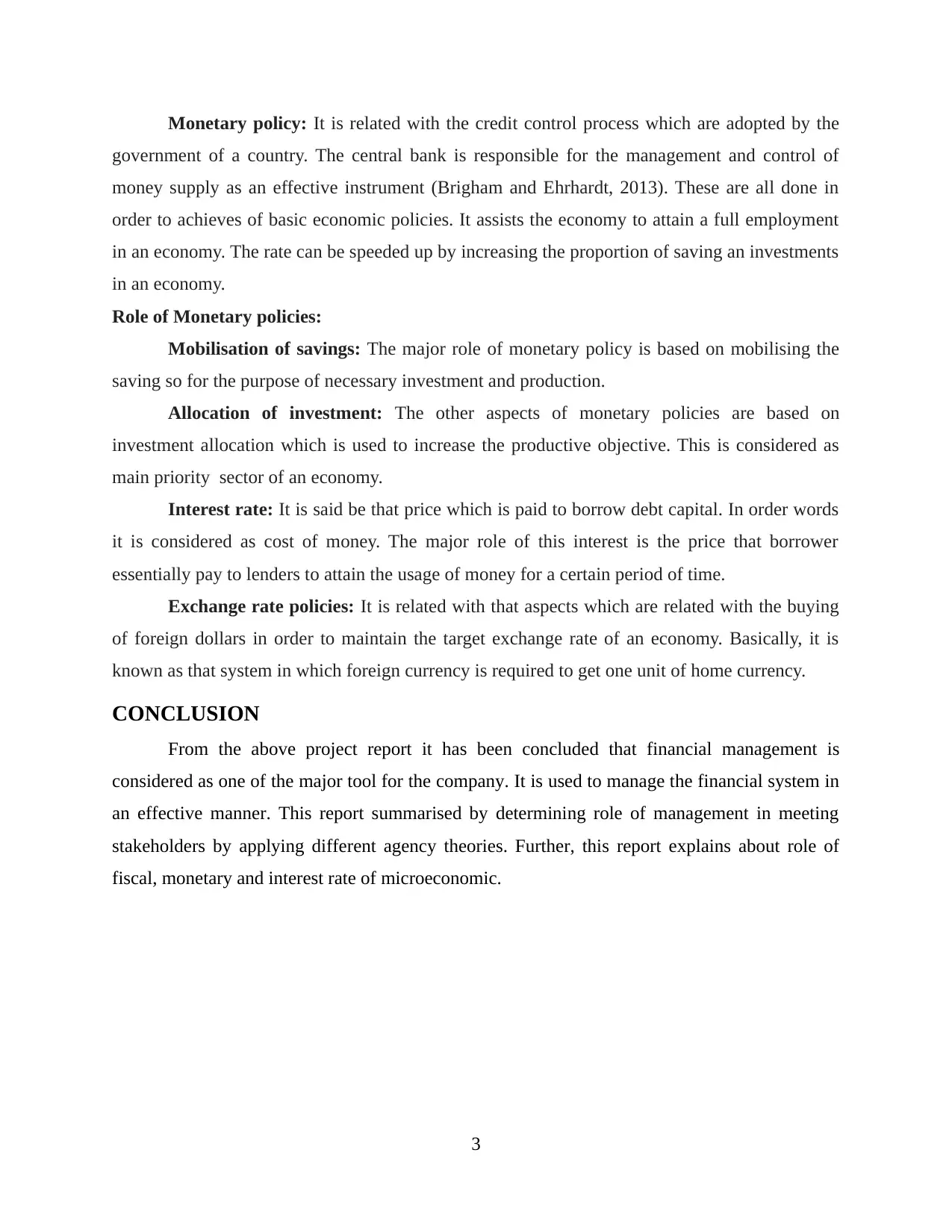
Monetary policy: It is related with the credit control process which are adopted by the
government of a country. The central bank is responsible for the management and control of
money supply as an effective instrument (Brigham and Ehrhardt, 2013). These are all done in
order to achieves of basic economic policies. It assists the economy to attain a full employment
in an economy. The rate can be speeded up by increasing the proportion of saving an investments
in an economy.
Role of Monetary policies:
Mobilisation of savings: The major role of monetary policy is based on mobilising the
saving so for the purpose of necessary investment and production.
Allocation of investment: The other aspects of monetary policies are based on
investment allocation which is used to increase the productive objective. This is considered as
main priority sector of an economy.
Interest rate: It is said be that price which is paid to borrow debt capital. In order words
it is considered as cost of money. The major role of this interest is the price that borrower
essentially pay to lenders to attain the usage of money for a certain period of time.
Exchange rate policies: It is related with that aspects which are related with the buying
of foreign dollars in order to maintain the target exchange rate of an economy. Basically, it is
known as that system in which foreign currency is required to get one unit of home currency.
CONCLUSION
From the above project report it has been concluded that financial management is
considered as one of the major tool for the company. It is used to manage the financial system in
an effective manner. This report summarised by determining role of management in meeting
stakeholders by applying different agency theories. Further, this report explains about role of
fiscal, monetary and interest rate of microeconomic.
3
government of a country. The central bank is responsible for the management and control of
money supply as an effective instrument (Brigham and Ehrhardt, 2013). These are all done in
order to achieves of basic economic policies. It assists the economy to attain a full employment
in an economy. The rate can be speeded up by increasing the proportion of saving an investments
in an economy.
Role of Monetary policies:
Mobilisation of savings: The major role of monetary policy is based on mobilising the
saving so for the purpose of necessary investment and production.
Allocation of investment: The other aspects of monetary policies are based on
investment allocation which is used to increase the productive objective. This is considered as
main priority sector of an economy.
Interest rate: It is said be that price which is paid to borrow debt capital. In order words
it is considered as cost of money. The major role of this interest is the price that borrower
essentially pay to lenders to attain the usage of money for a certain period of time.
Exchange rate policies: It is related with that aspects which are related with the buying
of foreign dollars in order to maintain the target exchange rate of an economy. Basically, it is
known as that system in which foreign currency is required to get one unit of home currency.
CONCLUSION
From the above project report it has been concluded that financial management is
considered as one of the major tool for the company. It is used to manage the financial system in
an effective manner. This report summarised by determining role of management in meeting
stakeholders by applying different agency theories. Further, this report explains about role of
fiscal, monetary and interest rate of microeconomic.
3
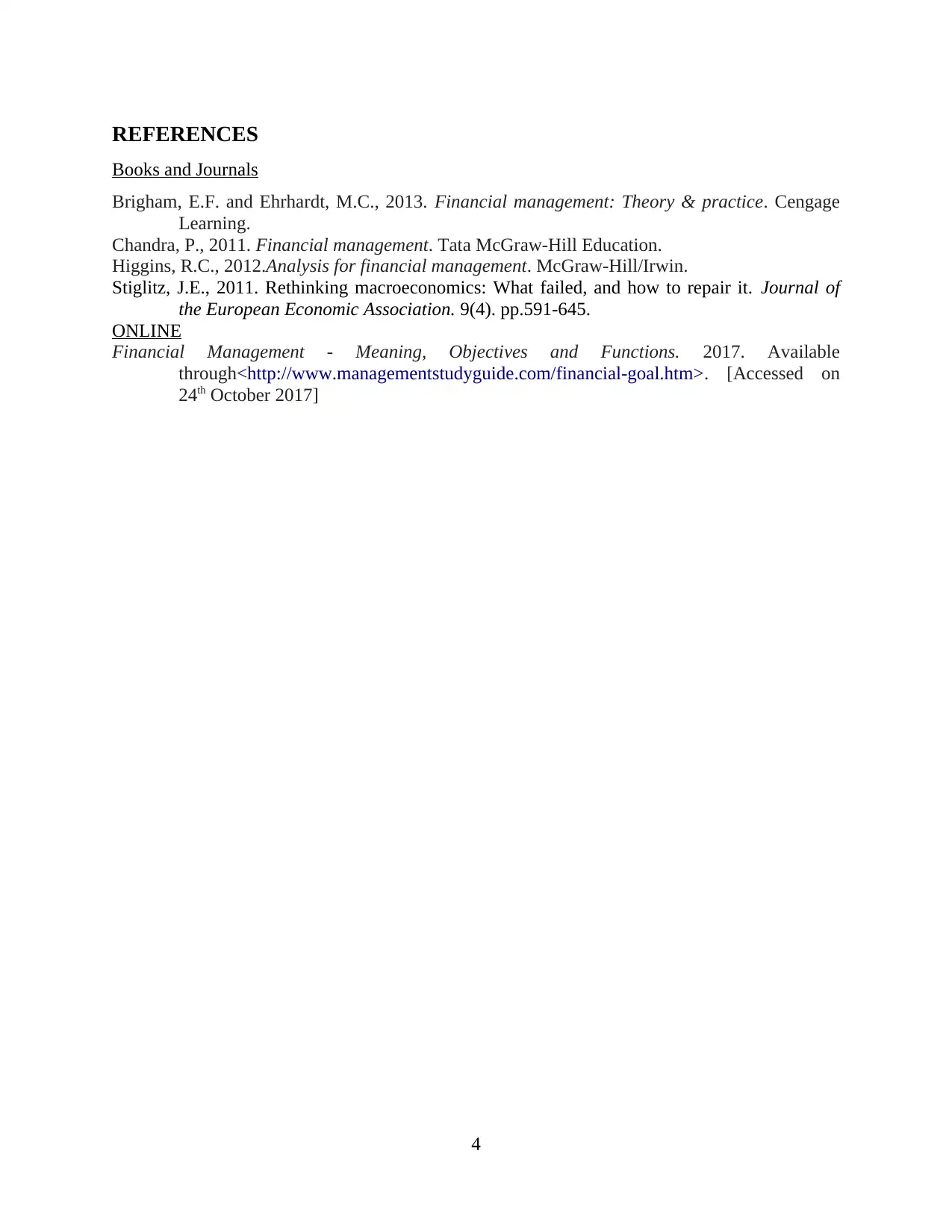
REFERENCES
Books and Journals
Brigham, E.F. and Ehrhardt, M.C., 2013. Financial management: Theory & practice. Cengage
Learning.
Chandra, P., 2011. Financial management. Tata McGraw-Hill Education.
Higgins, R.C., 2012.Analysis for financial management. McGraw-Hill/Irwin.
Stiglitz, J.E., 2011. Rethinking macroeconomics: What failed, and how to repair it. Journal of
the European Economic Association. 9(4). pp.591-645.
ONLINE
Financial Management - Meaning, Objectives and Functions. 2017. Available
through<http://www.managementstudyguide.com/financial-goal.htm>. [Accessed on
24th October 2017]
4
Books and Journals
Brigham, E.F. and Ehrhardt, M.C., 2013. Financial management: Theory & practice. Cengage
Learning.
Chandra, P., 2011. Financial management. Tata McGraw-Hill Education.
Higgins, R.C., 2012.Analysis for financial management. McGraw-Hill/Irwin.
Stiglitz, J.E., 2011. Rethinking macroeconomics: What failed, and how to repair it. Journal of
the European Economic Association. 9(4). pp.591-645.
ONLINE
Financial Management - Meaning, Objectives and Functions. 2017. Available
through<http://www.managementstudyguide.com/financial-goal.htm>. [Accessed on
24th October 2017]
4
⊘ This is a preview!⊘
Do you want full access?
Subscribe today to unlock all pages.

Trusted by 1+ million students worldwide
1 out of 6
Related Documents
Your All-in-One AI-Powered Toolkit for Academic Success.
+13062052269
info@desklib.com
Available 24*7 on WhatsApp / Email
![[object Object]](/_next/static/media/star-bottom.7253800d.svg)
Unlock your academic potential
Copyright © 2020–2026 A2Z Services. All Rights Reserved. Developed and managed by ZUCOL.





